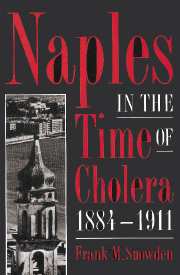Book contents
- Frontmatter
- Contents
- List of figures
- List of tables
- Preface
- Glossary of Italian and Neapolitan term
- Introduction
- PART I SANITARY ANXIETIES
- PART II THE PUBLIC EPIDEMIC OF 1884
- PART III RISANAMENTO AND MIASMA
- PART IV THE SECRET EPIDEMIC OF 1910–1911
- 6 The return of cholera: 1910
- 7 Concealment and crisis: 1911
- Conclusion: Neapolitan cholera and Italian politics
- Appendix
- Notes
- Select bibliography
- Index
7 - Concealment and crisis: 1911
Published online by Cambridge University Press: 04 August 2010
- Frontmatter
- Contents
- List of figures
- List of tables
- Preface
- Glossary of Italian and Neapolitan term
- Introduction
- PART I SANITARY ANXIETIES
- PART II THE PUBLIC EPIDEMIC OF 1884
- PART III RISANAMENTO AND MIASMA
- PART IV THE SECRET EPIDEMIC OF 1910–1911
- 6 The return of cholera: 1910
- 7 Concealment and crisis: 1911
- Conclusion: Neapolitan cholera and Italian politics
- Appendix
- Notes
- Select bibliography
- Index
Summary
FROM SCATTERED CASES TO A NEW EPIDEMIC: THE SPRING OF 1911
Almost unnoticed, Asiatic cholera persisted throughout the winter of 1910–11 – despite resolute denials by Italian and Neapolitan officials. As we have seen, occasional ‘stragglers’ attracted the attention of anxious American officials for months after Italian authorities had declared the autumn outbreak finished. In January 1911 Henry Geddings informed Washington that the continuing existence of foci of infection and ‘the inertness of the authorities’ warranted a ‘gloomy prognosis’ for the spring and summer. On the basis of this information, Surgeon- General Walter Wyman published in the sanitary bulletin Public Health Reports an official warning to Americans contemplating ‘the usual tour of southern Italy in the spring and summer’. The abiding presence of the disease in the city, he argued, suggested that there was a grave danger that the return of warm weather would unleash a new and possibly even larger epidemic. American citizens would be wise, he cautioned, to consider alternative destinations.
Between February and May, a sharp divergence developed between the public pronouncements of Italian authorities and the confidential files of the Department of Public Health. Stunned by the Neapolitan revolt, state officials categorically repudiated all suggestions that there was any danger to public health. The outbreak that caused such alarm first in Apulia and then in Naples, they claimed, had been totally vanquished. Signor Cusani, the Italian Ambassador to Washington, specifically protested to the American Government about the offensive, unjustified and – above all – public musings of the Surgeon-General and his subordinates. ‘Italy’, Cusani informed the Secretary of State, ‘is entirely free from cholera and public health is excellent.’
- Type
- Chapter
- Information
- Naples in the Time of Cholera, 1884–1911 , pp. 297 - 359Publisher: Cambridge University PressPrint publication year: 1995



